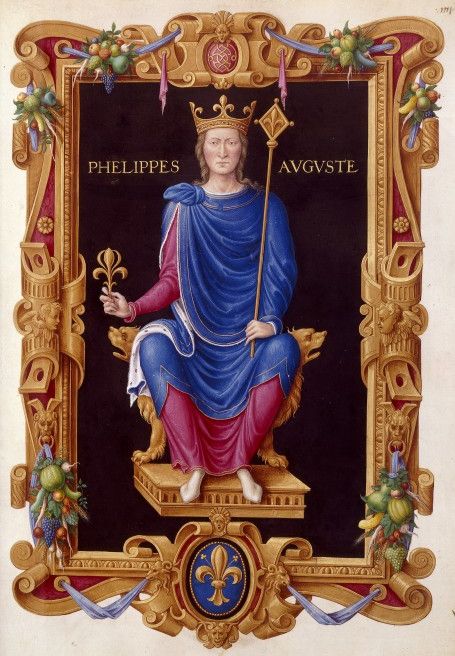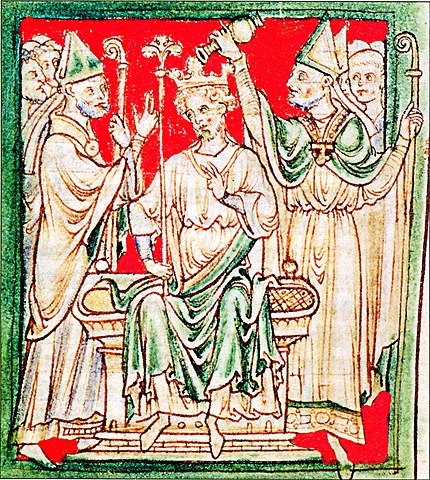A Hard Act to Follow
 The Coeur de
Lion, as he became known, was a younger son of a brilliant father, who had
welded together an empire. Henry II,
who started a soldiering career at the age of 13, had taken his patrimony of
Anjou and added it to the kingdom he helped win, as part of his mother’s
inheritance from her father King Henry I. England
came with Normandy tacked on and to this, by virtue of his marriage to Eleanor, was added
Aquitaine.
The Coeur de
Lion, as he became known, was a younger son of a brilliant father, who had
welded together an empire. Henry II,
who started a soldiering career at the age of 13, had taken his patrimony of
Anjou and added it to the kingdom he helped win, as part of his mother’s
inheritance from her father King Henry I. England
came with Normandy tacked on and to this, by virtue of his marriage to Eleanor, was added
Aquitaine.  |
| Henry II & Eleanor holding court |
Henry was a
hard act to follow and Richard and his brothers Henry[i], Geoffrey and John were desperate
for power, encouraged by their mother. A veteran of the war between the sexes;
she married first Louis,
King of France and then Henry. Eleanor in her own right had been heiress to the
lands of Aquitaine. This had been added, on her marriage to Henry, to what
became known as the Angevin
Empire.
Born on 8th
September 1157, Richard was a little older than his father when he first went
into battle putting down a rebellion, against his father, in Poitou at the age
of 16. He was a very competitive son of a very competitive father, who was
usually at odds with his liege lord, the king of France[ii].
Family Infighting
By the time
Richard was born Henry was finding that ruling his far-flung empire was more
than one man could manage on his own. Despite this realisation Henry gave up
power to his sons only grudgingly and often humiliated them by abrupt removal
of that power.
The Young
King Henry was driven into rebellion chafing against his lack of power, despite
having been crowned junior king. That rebellion was crushed, but Henry was
forgiven by his father. He died in 1186 of dysentery. Geoffrey, the second son,
was crushed to death in a tournament mêlée. Richard and John were now the
eldest sons and their mother, bitterly estranged from their father[iii], encouraged their
ambitions.
Eleanor
encouraged her favourite son Richard to demand that he be named heir to the
throne. Henry refused; believing that satisfying the demand would only increase
Richard’s demands. The refusal resulted in the second rebellion against his
rule by his sons.
Richard’s
marriage on 11th May 1191 to Berengaria, the
eldest daughter of the King of Navarre was promoted by his mother and required
the repudiation of Princess Alys[iv], sister to Philip II.
Rumour claimed that Richard’s father was already sleeping with Alys, who bore
Henry a half-brother to Richard and John.
Philip II of France
King Philip II[v] of France was eager to
reduce the power of his English over-powerful vassal and schemed with Henry’s
sons to overthrow him. According to Roger of Howden at this
time the relationship between Philip and Richard was such that
‘Philip so honoured him that
every day they ate from the same dish, and at night the bed did not separate
them.’[vi]
Philip may
have been persuading Richard that Henry would pass over him in favour of making
John, his favourite son, king. Richard drew on the treasury at Chinon[vii] and began putting his
castles in Poitou on readiness for a fight. Learning of problems in the Holy
Land merely honed Philip and Richard’s desire to deal with Henry; a thorn in
both their sides. Richard took the Cross[viii] without seeking the
permission of his liege lord, a serious breach of his responsibility as his
father’s vassal.
Richard and
Philip had the whip hand and Henry was forced to terms, humbling himself before
the two younger men. Giving the kiss of peace Henry told his son
‘God spare me long enough to
take revenge on you.’[ix]
Henry was
further humiliated by the knowledge that his favourite child John had joined
the rebellion against him. Richard’s rebellion had resulted in part from having
lands taken from him and given to John Lackland, as his brother was known.
Within two days Henry was dead, the only child present at the death was his
illegitimate son Geoffrey, who had been Henry’s chancellor.
Richard the King
Richard’s
coronation was on 6th July 1189; he was king for barely more than
ten years and in those ten years he spent as little as twelve months in the
country he ruled; preferring to chase the chimera of retaking the kingdom of
Jerusalem for Christianity to the everyday slog of ruling. He left his empire
in the hands of his brother John.
Eleanor now
planned on being the power behind the throne, something that she had never
been, even in the early days of her relationship with her husband. The most
unpopular of Henry’s senior officials were removed from office and the
coronation was a bling-ridden affair to please the masses. Women and Jews were
forbidden to attend but the Jewish population of London presented a gift to
Richard. The Jewish gift was considered part of a heinous plot and a massacre
ensued. It took so long
‘To send them to the devil,
that the work had to be continued a second day.’[x]
Richard was
in too much of a hurry to go on crusade to give the Jews the protection he had
promised and after he left for the Holy Land a massacre took place in York.
Richard’s
departure resulted in his barons busying themselves with re-arming themselves
and strengthening their strongholds; bringing back memories of the era of havoc
before Henry II.
‘As the earth shudders at
the absence of the sun, so the face of the kingdom was changed by the departure
of the king. Nobles became busy; castles were strengthened, towns fortified,
moats dug.’[xi]
The king’s
choice of the Bishop of Ely as his senior official led to the barons flocking
to support John, when Ely starting flooding government posts with his own men.
John took over the reins of government and in 1192 news reached the country
that Richard had been taken prisoner on his journey home by the Holy Roman
Emperor.
Castle Durnstein where Richard held captive
Richard now
became the subject of a bidding war and was finally released in February 1194
on the promise of payment of 34 tons of gold; three times the annual income of
the country. His brother had hoped that Richard would remain incarcerated and
was horrified when Richard arrived to forgive
him, thus successfully emasculating him as an alternative power source, telling
the 27 year old John
‘Think no more of it John,
you are only a child who has been led astray by evil councillors.’[xii]
Richard’s
focus during his reign was not on England but on his lands in France, and most
of his time following his return from crusade was spent there. On his return
from captivity Richard focussed his efforts on the recapturing of his lands in
Normandy lost in his absence. Payment for the armies came from his cash cow,
England. By 1198 Richard had re-conquered most of his French possessions.
In 1199 besieging
a castle at Limoges, Richard was shot by a stray arrow from one of the
defenders. Richard had refused to allow the defenders to surrender as he was
infuriated by their resistance and was determined to punish them. His wound
turned gangrenous and he died to be succeeded by John, his life-long rival. There
appears to be evidence that Richard was at least bisexual, if not homosexual[xiii] and his marriage to Berengaria
was childless.
Berengaria
‘Richard’s courage,
shrewdness, energy and patience made him the most remarkable ruler of his
times.’[xv]
This verdict
of course related to his actions in Outremer[xvi].
Richard was
a warrior, although not the ‘parfit gentil knight’ that later historians have
portrayed. He and his brother were both violent, vain and given to ornamental
excess. Churchill tells us
‘Although Richard was an
absentee king, whose causes and virtues had proved a drain and a disappointment
to his subjects, his realm had not suffered as much as it would have seemed.
The intrigues of the nobles and the treacheries of Prince John had been
restrained by an impersonal government ruling with force.’[xvii]
The system
of governance set up by his father had functioned in Richard’s absence. Perhaps
his absence was the reason Richard failed to undo his father’s ground work in
law and government.
Bibliography
A History of
the English Speaking Peoples, Vol 1 – Winston S Churchill, Cassell & Co
1967
Richard the
Lionheart – John Gillingham, George Weidenfeld & Nicholson 1989
A History of
Britain, Vol 1 – Simon Schama, BBC Worldwide 2001
Henry II –
WL Warren, Yale University Press 2000
King John –
WL Warren, Yale University Press 1997[i] Also known as the Young King
[ii]
For his lands held in France
[iii]
She had been imprisoned by Henry following the first rebellion of her sons in
1173 again fomented by herself. She was released following the death of young
Henry.
[iv]
Henry had already designated Alys as Richard’s future wife
[v]
Enthroned on 1st November 1179
[vi]
Henry II - Warren
[vii]
One of Henry’s key fortresses
[viii]
A commitment to go on crusade
[ix]
A History of Britain - Schama
[x]
Ibid
[xi]
Ibid
[xii]
Ibid
[xiii]
Disputed by Gillingham
[xiv]
In the immortal words of Sellar and Yeatman
[xv]
Richard the Lionheart - Gillingham
[xvi]
Another name for the Holy Land in medieval times.
[xvii]
A History of the English-Speaking Peoples - Churchill




No comments:
Post a Comment
Note: only a member of this blog may post a comment.